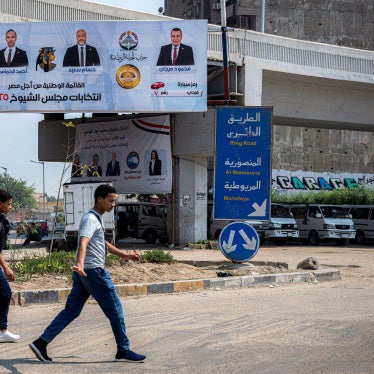On the eve of the Tunisian President's visit to the U.S., Human Rights Watch calls for Bush to uphold his commitment to mideast democracy and human rights by raising the human rights issues that Tunisia currently faces
“Tunisia bills itself as a moderate Muslim nation,” said Joe Stork, acting director of Human Rights Watch’s Middle East and North Africa division. “But there is nothing moderate in the way authorities repress nearly all forms of dissent.”
President Ben Ali has won U.S. praise for his cooperation in antiterrorism efforts. Tunisia receives modest U.S. military aid, and the two countries conduct joint military exercises.
U.S. Secretary of State Colin Powell urged political reforms and greater openness in Tunisia during a visit to Tunis in December. However, President Bush has omitted mention of Tunisia in his speeches advocating democracy in the region. Ben Ali’s visit to Washington is the first by an Arab leader since Bush unveiled his initiative for democracy in the Middle East.
“The credibility of President Bush’s plan to promote democracy for the Middle East is on the line,” Stork said. “Ben Ali’s government tolerates almost no dissent. Bush needs to speak candidly and publicly to demonstrate that his initiative is serious.”
Tunisia’s ruling party dominates political life nationally and locally. In 2002 the Tunisian parliament approved constitutional amendments making President Ben Ali, who came to power in 1987, eligible to stand for reelection in October 2004 and again in 2009. In the past three presidential elections, Ben Ali was reelected with an official tally of more than 99 percent. Tunisia has few genuinely independent organizations. Apart from a few low-circulation magazines, none of the print and broadcast media offer critical coverage of government policies.
“Tunisia should be leading the way on democracy in the region, given its economic and social achievements, and the status of women” said Stork. “Instead it has moved backwards.”
Most of Tunisia’s 500 political prisoners are suspected Islamists who were convicted after unfair trials on nonviolent charges such as membership in a political organization outlawed by the government.
The Tunisian judiciary lacks independence, especially in political trials. Judges turn a blind eye to torture allegations and procedural irregularities, convicting defendants on the basis of dubious confessions. Prisons are overcrowded and conditions are harsh. Several prominent long-term prisoners have been held for years at a time in isolation, where they are denied reading and writing materials and adequate medical care. Released political prisoners are frequently refused passports and subject to onerous sign-in requirements with the police. The police also put pressure on employers not to hire ex-prisoners.
“The government claims it is simply applying the law to curb illegal acts by extremists,” said Stork. “But those who are jailed and harassed encompass a wide range of dissidents, including nonviolent Islamists, secular liberals, leftists and human rights activists.”








